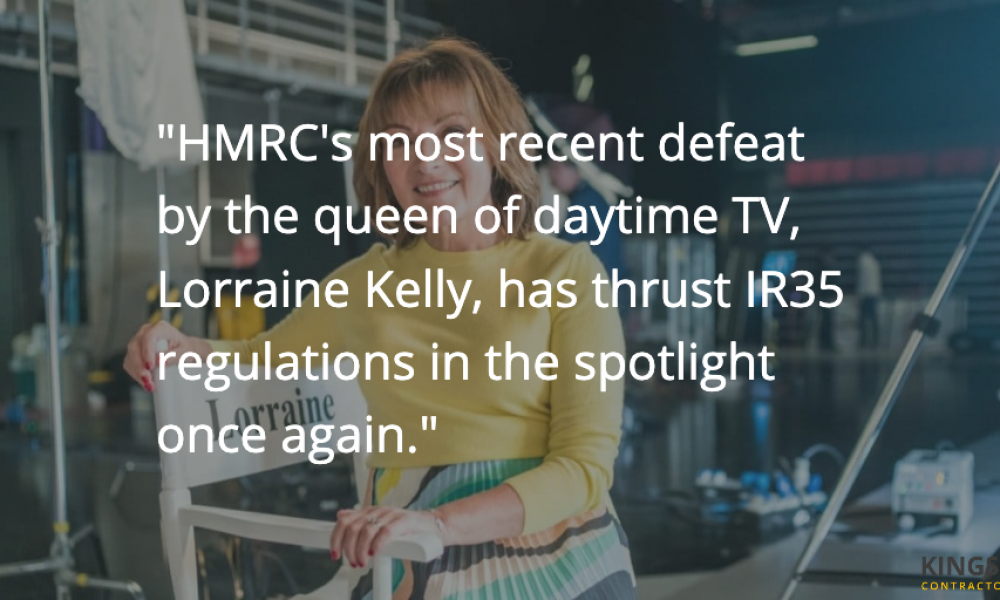How to show you have the right to substitution as a contractor
With the IR35 reforms here, now is the time for you to look at your contracts and working practices to…
HMRC’s most recent defeat by the queen of daytime TV, Lorraine Kelly, has thrust IR35 regulations in the spotlight once…

HMRC’s most recent defeat by the queen of daytime TV, Lorraine Kelly, has thrust IR35 regulations in the spotlight once again. But how can contractors be assured that they won’t fall foul of HMRC’s crackdown on disguised employment?
Much of the press coverage focused on the judgement that Kelly does not appear on television as herself, but rather performs the chatty persona Lorraine Kelly. Although you might not be able to get away with arguing that you perform your freelance duties as a more entertaining version of yourself, there were many other aspects of Kelly’s successful defence that can serve as useful guidance for contractors with regard to the various indicators of genuine self-employment as outlined in IR35 legislation. The judge for Kelly’s trial declared that they did not consider this a borderline case as they dismissed the £1.2million bill for tax and national insurance that had been claimed against her.
Control was cited by judge Jennifer Dean as the deciding factor in Lorraine Kelly’s case. Put simply, this indicator refers to the extent to which a contractor is able to exercise control over their own work for the client. Employees are regarded as being more closely supervised, subject to specific direction and unable to exercise a great degree of control within their working patterns and environment. A truly self-employed individual, on the other hand, while working to a brief or contract, would have a far higher degree of control over how and when that work was carried out. Kelly’s defence argued that she had control over her performance, the topics discussed on her show, who she chose to interview, how closely she followed the script and her working hours. For example, she had undertaken a 4-week Arctic expedition during the period in question, in addition to the 10 weeks holiday specified in her contract.
Mutuality of obligation describes the relationship between an employer and an employee. In such a relationship, the employer is obliged to provide consistent and paid work for the employee, and the employee is obliged to do it as instructed. HMRC therefore expects to see a different relationship between self-employed workers and their clients. Contracts that are open-ended, rolling or not project-based are likely to fall foul of this part of legislation. Kelly argued that her contract was not guaranteed to be renewed each time, and that ITV did not have to pay her if she missed a show, and in turn her show might occasionally be cancelled by ITV at short notice (e.g. if a big news story breaks).
Another one of the major indicators of IR35 status is whether the relationship between client and worker is one of personal service. One way to ensure that you don’t fall foul of this ruling is to insist on a right of substitution? in your contracts, meaning that if you are unable to do the work, you can provide someone else (an employee of yours, or another contractor) to do it instead, delivering the same service and/or contract to the client. Obviously, this is different to an employee relationship, where you can’t just send someone to work in your place! Interestingly, in the Kelly case, this was seen as a personal service relationship (because no one else can perform Lorraine Kelly’s persona) but this was not decisive in this case because so many other factors pointed strongly to genuine self-employment. Also, despite HMRC’s argument that ITV would have final say on a choice of substitute, her solicitor argued that Ms Kelly was instrumental in identifying substitute presenters during her holidays.
Employees can be given equipment to help them do their jobs computers, mobiles, company cars. Those who are self-employed are expected to provide their own equipment. Aside from being given an earpiece and clothes before she went on air each time, Kelly did not benefit from being provided with any equipment to help her do her job. She has no office space and prepares for her show at home.
The judge noted that Kelly worked on a number of other projects at the same time as her presenting for ITV, including writing, design, and appearing in adverts, and that her contract with ITV specifically allowed her to take on work for other channels. Having several clients at once is a strong indicator of genuine self-employment, so try to make sure that all your contracts don’t accrue around the same client, or they could be seen as your employer.
Kelly argued that she did not receive employee benefits such as sick pay or a pension. Under this indicator, HMRC is looking for evidence that a self-employed person takes on the risk of their own business as an indictor of genuine self-employment.
To qualify as self-employed, HMRC will also take into account evidence that indicates that the business exists outside of the relationship between contractor and one client. This could be things such as a website, letterheads, business cards and, of course, business insurance! Having specialist contractor insurance, as well as protecting you from many of the legal risks of being self-employed, also sends a strong signal to HMRC that you are genuinely self-employed and that your business is its own legal entity. If you’re a contractor currently operating without insurance, visit our website today for a quick quote and make sure you’re covered in all senses.